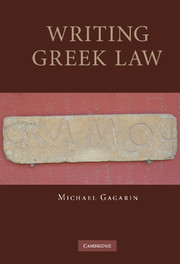Book contents
- Frontmatter
- Contents
- List of illustrations
- Preface and Acknowledgments
- List of abbreviations
- Introduction: Writing Greek Law
- Chapter 1 Law before Writing
- Chapter 2 Writing and Written Laws
- Chapter 3 Why the Greeks Wrote Laws
- Chapter 4 Why Draco Wrote his Homicide Law
- Chapter 5 Oral and Written in Archaic Greek Law
- Chapter 6 Writing Laws in Fifth-Century Gortyn
- Chapter 7 Writing the Gortyn Code
- Chapter 8 Writing Law in Classical Athens
- Chapter 9 Writing Athenian Law: a Comparative Perspective
- Chapter 10 Writing Law in Hellenistic Greece
- Conclusion: Writing Greek Law
- Appendices
- Bibliography
- Index Locorum
- Subject Index
Chapter 5 - Oral and Written in Archaic Greek Law
Published online by Cambridge University Press: 22 September 2009
- Frontmatter
- Contents
- List of illustrations
- Preface and Acknowledgments
- List of abbreviations
- Introduction: Writing Greek Law
- Chapter 1 Law before Writing
- Chapter 2 Writing and Written Laws
- Chapter 3 Why the Greeks Wrote Laws
- Chapter 4 Why Draco Wrote his Homicide Law
- Chapter 5 Oral and Written in Archaic Greek Law
- Chapter 6 Writing Laws in Fifth-Century Gortyn
- Chapter 7 Writing the Gortyn Code
- Chapter 8 Writing Law in Classical Athens
- Chapter 9 Writing Athenian Law: a Comparative Perspective
- Chapter 10 Writing Law in Hellenistic Greece
- Conclusion: Writing Greek Law
- Appendices
- Bibliography
- Index Locorum
- Subject Index
Summary
As we have seen, during the archaic period laws were written down and publicly displayed in cities all over Greece, but almost nothing else of a legal nature was written and publicly displayed. One consequence of this was that terms like “writing” (graphos, grammata) could be used without qualification to designate a written law. In addition to examples from Elis (IvO 7) and Argos (IGiv 506) noted in Chapter Two, other texts from Elis and Eleutherna also use expressions designating writing in this way. Another inscription from Elis (IvO 9; Nomima 1.52, ML 17) begins by designating itself a rhatra or “pronouncement,” one of the other terms by which archaic cities designated written laws, but later warns against destroying “these writings” (ta graphea). Here, as in IvO 7 (Chapter Two), rhatra designates the pronouncement of the people in assembly enacting the law and graphos (singular and plural) designates the text of that pronouncement after it is written down as the law. And a law attributed to Solon provides that any agreement made by the members of certain organizations is valid “as long as no public writing (dēmosia grammata) prohibits it” (Ruschenbusch 1966: f76a). Although Solon elsewhere calls his laws thesmoi, it appears that here he uses the expression “public writings” to designate the city's laws, perhaps to emphasize that these are written and publicly displayed.
- Type
- Chapter
- Information
- Writing Greek Law , pp. 110 - 121Publisher: Cambridge University PressPrint publication year: 2008



